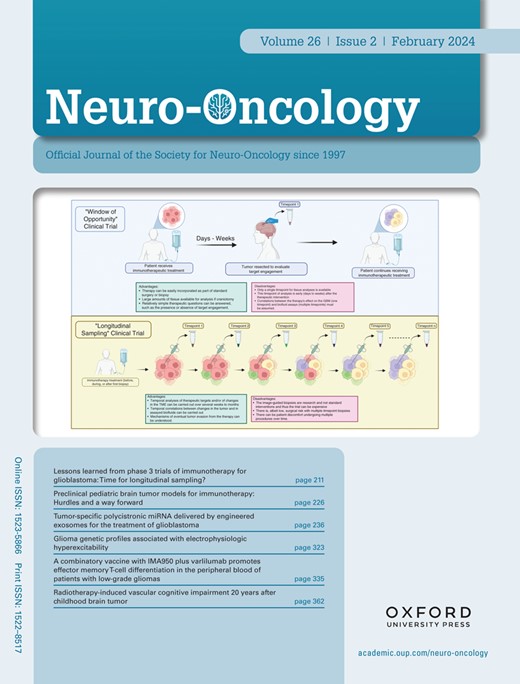儿童脑肿瘤后的发育——一项纵向研究
IF 16.4
1区 医学
Q1 CLINICAL NEUROLOGY
引用次数: 0
摘要
背景:儿童脑肿瘤(PBTs)患者的认知功能通常会下降或停滞。认知能力下降的一些潜在危险因素已被确定,包括性别(女性)、诊断时年龄小、基线智商较高、诊断时脑积水、全脑放疗(WBRT)治疗以及较大的辐射场和/或剂量。这项纵向研究的目的是统计模拟大量基于人群的PBT幸存者的认知能力下降率,并找到导致更快下降的危险因素。方法:研究参与者为2001-2013年间诊断为PBTs和/或2006 -2013年间年满18岁的患者(n = 151)。纵向收集语言能力、知觉推理能力、一般认知能力、听觉工作记忆、认知处理速度、视觉工作记忆和持续注意力的测量结果。采用多水平线性模型(MLM)来评估样本的认知能力下降率,并估计影响下降率的基线值(危险因素)。结果:在所有患者类别中,大多数认知能力都有显著下降,只有基本的语言能力稳定或改善。预测基线认知能力降低的变量包括性别(男性)、诊断年龄、幕上外侧肿瘤、较大肿瘤大小和wbrtor化疗治疗。结论:无论接受何种治疗,儿童BT幸存者都会经历与年龄相关的认知能力下降。诊断PBT时年龄小、男性、性别、幕上外侧肿瘤、较大肿瘤以及WBRT或化疗治疗均与基线成绩降低相关。(少)本文章由计算机程序翻译,如有差异,请以英文原文为准。
Development after pediatric brain tumor-a longitudinal study
Background: Patients treated for Pediatric Brain Tumors (PBTs) often experience a decline/stagnation in their cognitive functioning.Anumber of potential risk factors for cognitive decline have been identified including gender (female), young age-at-diagnosis, higher baseline IQ, hydrocephalus at diagnosis, treatment with Whole Brain Radiation Therapy (WBRT), and larger radiation field and/or dose. The aim of this longitudinal study was to statistically model the rate of cognitive decline in a large population-based sample of PBT survivors and to find risk factors for a faster decline. Methods: Study participants were patients diagnosed with PBTs between 2001-2013 and/or who turned 18 years of age between 2006 and 2013 (n = 151). Measures of verbal ability, perceptual reasoning, general cognitive ability, auditory working memory, cognitive processing speed, visual workingmemory and sustained attention were collected longitudinally. Multilevel Linear Modelling (MLM) was used to evaluate the rate of cognitive decline in the sample and to estimate baseline values (risk factors) influencing the rate of decline. Results: A significant decline was found for most cognitive abilities across all patient categories with only elementary verbal skills either stable or improving. Variables predicting lower cognitive performance at baseline were gender (male), age at diagnosis, supratentorial lateral tumor, larger tumor size, and treatment withWBRTor chemotherapy.Conclusions: Pediatric BT survivors experience a decline in age related cognitive performance, regardless of the treatment received. Young age at PBT diagnosis, male, gender, supratentorial lateral tumors, larger tumors and treatment with WBRT or chemotherapy were all correlated with a lowered baseline performance. (Less)
求助全文
通过发布文献求助,成功后即可免费获取论文全文。
去求助
来源期刊

Neuro-oncology
医学-临床神经学
CiteScore
27.20
自引率
6.30%
发文量
1434
审稿时长
3-8 weeks
期刊介绍:
Neuro-Oncology, the official journal of the Society for Neuro-Oncology, has been published monthly since January 2010. Affiliated with the Japan Society for Neuro-Oncology and the European Association of Neuro-Oncology, it is a global leader in the field.
The journal is committed to swiftly disseminating high-quality information across all areas of neuro-oncology. It features peer-reviewed articles, reviews, symposia on various topics, abstracts from annual meetings, and updates from neuro-oncology societies worldwide.
 求助内容:
求助内容: 应助结果提醒方式:
应助结果提醒方式:


